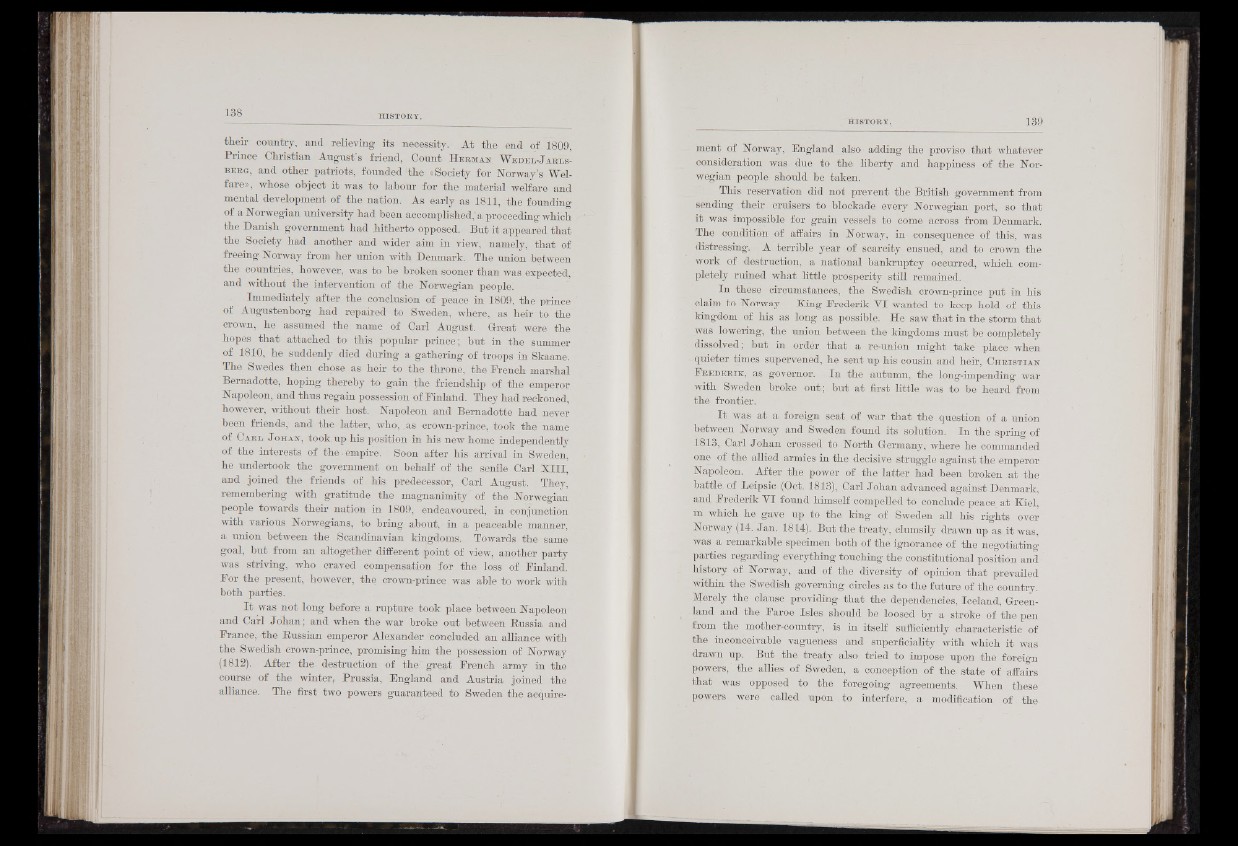
their country, and relieving its necessity. At the end of 1809,
Prince Christian August’s friend, Count H e r m a n W e d e l - J a r l s -
b e r g , and other patriots, founded the «Society for Norway’s Welfare
», whose object it was to labour for the material welfare and
mental development of the nation. As early as 1811, the founding
of a Norwegian university had been accomplished,’a proceeding which
the Danish government had hitherto opposed. But it appeared that
the Society had another and wider aim in view, namely, that of
freeing Norway from her union with Denmark. The union between
the countries, however, was to be broken sooner than was expected,'
and without the intervention of the Norwegian people.
Immediately after the conclusion of peace in 1809, the prince
of Augustenborg had repaired to Sweden, where, as heir to the
crown, he assumed the name of Carl August. Great were the
hopes that attached to this popular prince; but in the summer
of 1810, he suddenly died during a gathering of troops in Skaane.
The Swedes then chose as heir to the throne, the French- marshal
Bemadotte, hoping thereby to gain the friendship of the emperor
Napoleon, and thus regain possession of Finland. They had reckoned,
however, without their host. Napoleon and Bemadotte had never
been friends, and the latter, who, .as erown-prince, took the name
of C a r l J o h a n , took up his position in his new home independently
of the interests of the- empire. Soon after his arrival in Sweden,
he undertook the government on behalf of the senile Carl XIII,
and joined the friends of his predecessor, Carl August. They,
remembering with gratitude the magnanimity ’ of the Norwegian
people towards their nation in 1809, endeavoured, in conjunction
with various Norwegians, to bring about, in a peaceable manner,
a union between the Scandinavian kingdoms. Towards the same
goal, but from an altogether different point of view, another party
was striving, who craved compensation for the loss of Finland.
For the present, however, the crown-prince was able to work with
both parties.
I t was not long before a rupture took place between Napoleon
and Carl Johan; and when the war broke out between Russia and
France, the Russian emperor Alexander concluded an alliance with
the Swedish crown-prince, promising him the possession of Norway
(1812). After the destruction of the great French army in the
course of the winter, Prussia, England and Austria joined the
alliance. The first two powers guaranteed to Sweden the acquireh
lS TO R Y ,
ment of Norway, England also - adding the proviso .that whatever
consideration was due to the liberty and happiness of the Norwegian
people should be taken.
This, reservation did not prevent the British government from
sending their cruisers to blockade every Norwegian port, so that
it was impossible for grain vessels to come across from Denmark.
The condition of affairs in Norway, in consequence of this, was
distressing. A terrible year of scarcity ensued, and to crown the
work of destruction, a national bankruptcy occurred, which completely
ruined what little prosperity still remained.
In these circumstances, the Swedish crown-prince put in his
claim to Norway. King Frederik YI wanted to keep hold of this
kingdom of his as long as possible. He saw that in the storm that
was lowering, the union between the kingdoms must be completely
dissolved; but in order that a re-union might take place when
quieter times supervened, he sent up his cousin and heir, C h r i s t i a n
F r e d e r i k , as governor. In the autumn, the long-impending war
with Sweden broke out?; but at first little was to be heard from
the frontier.
I t wa,s at a foreign seat of war that the question of a union
between Norway and Sweden found its solution. In the spring of
1813, Carl Johan crossed to North Germany, where he commanded
one of the allied armies in the decisive struggle against the emperor
Napoleon. After the power of the latter had been broken .at the
battle, of Leipsic (Oct. 1813), Carl Johan advanced against Denmark,
and Frederik YI found himself compelled to conclude peace, at Kiel,
in which he gave up to the king of Sweden all his rights over
Norway (14. Jan. 1814). But the treaty, clumsily drawn up as .it was,
was a remarkable specimen both of the ignorance of the negotiating
parties regarding everything touching the constitutional position and
history of Norway, and of the diversity of opinion that prevailed
within the Swedish governing circles??as to the future of the country.
Merely the clause providing that the dependencies, Iceland, Greenland
and the Faroe Isles should be loosed by a stroke of the pen
from the mother-country, is in itself sufficiently characteristic of
the inconceivable vagueness and superficiality with which it was
drawn up. But the treaty also tried to impose upon the foreign
powers, the allies of Sweden, a conception of the. state of affairs
that was opposed to the foregoing agreements. When these
powers were called upon to interfere, a modification of the